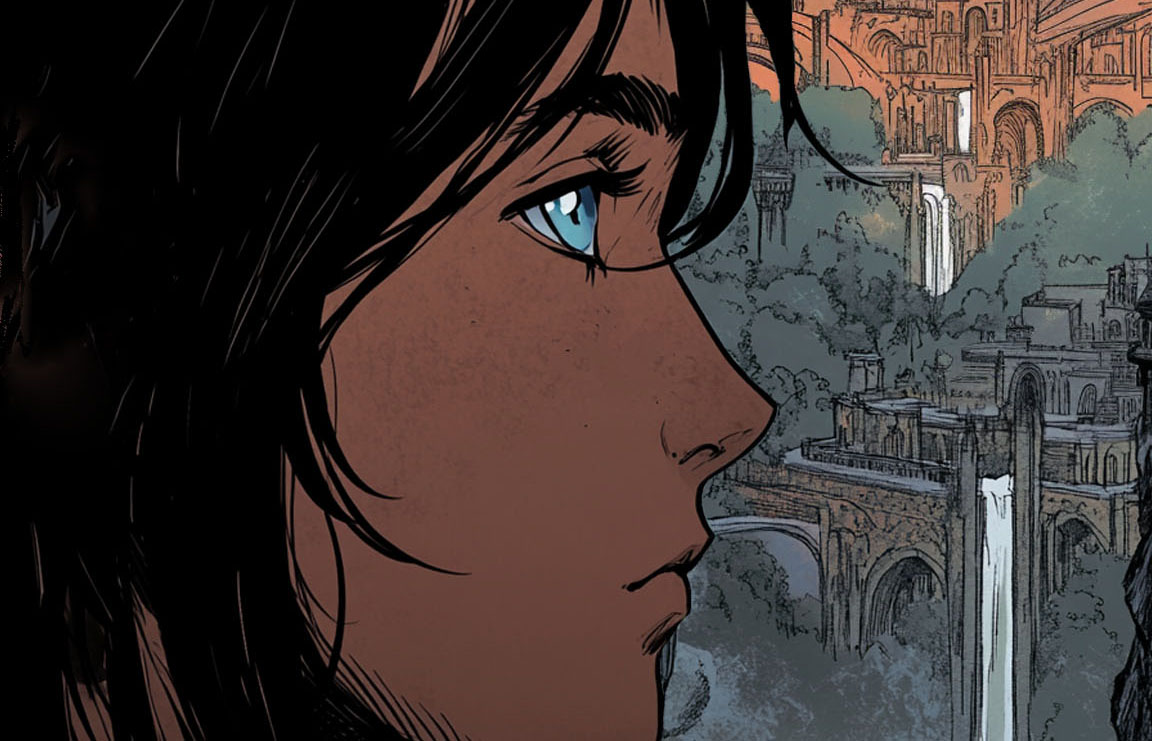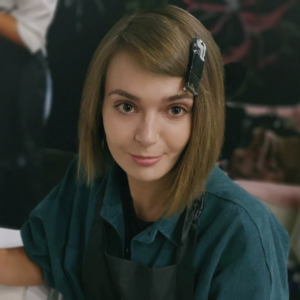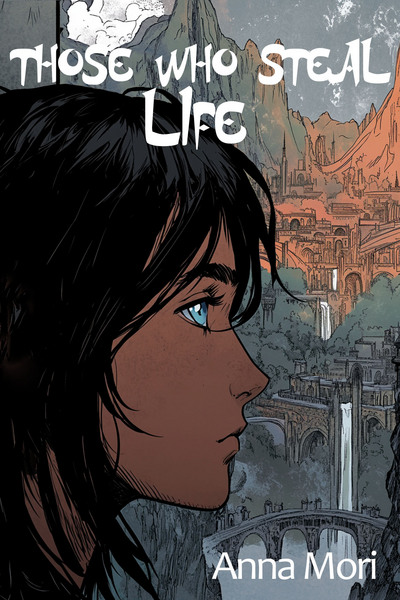As he followed Kiyanoush through the cavern halls, Narseh unconsciously slowed his pace.
So many marvels had been created in Eranshahr in recent times! This time, it was the immense mushrooms that took his breath away, casting a soft glow on the walls and ceiling. The reflections of their blue-green, teardrop-shaped caps multiplied in the mirror-smooth black stone and the dark waters of the underground river, like constellations scattered across the night sky. And to think, not long ago, the Arya stone-shapers had only used the inner mountain chambers that caught sunlight…
For over twenty years of war with Bizanth, the fragmented Arya clans had barely managed to cooperate — and never truly became one people. No matter how Ardashir had dreamed of uniting them, his authority extended only to matters of war and diplomacy; any attempt to reach further was met with fierce resistance. But Gelareh, in just three short years of peace, had done what he could not. Each clan still had its own two elected leaders, but now the shayasya of war and the shayasya of peace from the Owl Clan held the right to decide for all, and the other clans did not contest it.
Ardashir and Gelareh said this was a flawed system — that wise leaders existed outside their clan, no matter how much respect the Arya had for them — and that, in time, it should change. But Narseh understood little of such things. What he did know was that Aryan had finally become a true, unified land. One could see it in every detail. The combined magic of Arya shapers — from those who worked with weather and plants to those who worked with stone — had led to a greater understanding of where to sow, where to build grottoes, and where to pasture. Even the most unforgiving lands could be bargained with: harsh winds turned to gentle rains, barren soil became fertile. New plants ripened faster, unaffected by storms. New crafts emerged, new arts flourished. And, of course, the healers of different clans eagerly exchanged knowledge, developing shared techniques for treatment, youthfulness, and strengthening the body — and it was terribly interesting!
He bent over one of the bioluminescent growths, studying it closely.
He recalled that in the southern lands of the Blackbird and Golden Eagle Clans, deep caves harbored glowing mushrooms. Perhaps these had been brought from there? But these were huge, their glow was steady, their network spread in a structured, deliberate pattern, as if woven by human hands. No, these had certainly been cultivated. He wondered — what kind of magical influence had been used to enhance their luminescence? And how stable was the change?
"You’re looking at them as if you’ve never seen such a thing before," Kiyanoush chuckled.
"I haven’t! Just a month ago, there were no glowing mushrooms here — no grotto at all, in fact… Have they been enhanced with magic?"
"Yes, we modified them by influencing the spores while they were still forming."
Kiyanoush led him deeper into the hall, where two staircases wound up to a long balcony — clearly built to admire this vast, dark expanse, glittering with blue-green lights like a piece of the cosmos itself. A dozen people crowded along the railing.
Gelareh knelt before the balustrade, humming softly. Beneath her hands, strange flowers bloomed in the stone, and something fantastical coiled into rings — a creature with a long, scaled tail. Other stone-shapers stood in a semicircle around her, watching intently.
Beside her, Narseh spotted Kaveh. The boy was polishing the sculpture’s finished sections with a special powder, bringing them to a flawless smoothness. He looked very pleased — both with being allowed to help in such an important endeavor and with the admiration surrounding his mother and himself.
"Look who I’ve brought you!" Kiyanush called.
"Narseh!" Kaveh’s face lit up, and he promptly abandoned his work to fling himself into Narseh’s arms.
"Oof! You’re getting heavy, little one — I won’t be able to carry you much longer," Narseh remarked as he set him back on the ground.
"Uh-huh! I’m almost a grown-up now! Look, Mother even let me help her!"
"And in my admittedly amateur opinion, you’re doing an excellent job," Narseh said sincerely.
"Maybe I’ll be a stone-shaper too…"
Last month, Kaveh had sworn he would become a traveler. Before that, a weather-speaker. But Narseh nodded with utmost seriousness.
"Why not? Listen well, and perhaps one day, you’ll hear the song of stone."
Gelareh, smiling, stood and dusted off her hands. They embraced.
"You create such astonishing beauty," he told her. "These creatures adorning the balcony — they look exactly like the dragons of Chin!"
"I was inspired by the illustrations in that story collection you brought last time."
Only now did Narseh notice what lay on the wall behind the balcony. What had first seemed like a dark opening to another chamber was actually a blank, smooth expanse of stone, clearly meant to be filled — and framed by a pattern of glowing sigils.
"Wait… is that…?" he began in wonder.
"Yes, a message seal," Gelareh confirmed. "It works on the same principle as your mirrored parchment. There are several in every settlement now."
Travel and communication between the Arya clans had once been agonizingly slow. Messages were carried by trained birds and animals; if something was urgent, only those with the gift of leaping through the Other Side could deliver it swiftly. But now, travel itself had changed — self-guiding riverboats, propelled by tailored currents and winds, glided between settlements. Some dreamers had even begun speaking of flight.
The thought that all the Arya clans would soon be woven together by an interconnected web of knowledge seemed just as fantastical. And yet, it was becoming real — right before his eyes.
“…But surely, you must have seen such seals a hundred times in the land of Chin!” Gelareh concluded.
“Yes, of course, I have seen similar ones in Chin… But there, such seals are usually ancient, and new ones are rarely created — they hold their traditions in such reverence that any magical innovations are introduced with great caution.”
“Well, in our case,” one of the stone-shapers remarked with a chuckle, “things move faster. War has taken much from us; now it is time to create, not to destroy. Though, of course, some fear that we are changing too swiftly…”
“That is precisely the problem!” a woman interjected. “We risk ceasing to be Arya and becoming something else entirely. And now, this Unraveling as well…”
“And what, pray, is the latest grievance against the Unraveling?” a sharp voice cut in.
Only then did Narseh notice Laleh. She stood in the shadows against the wall, arms defiantly crossed over her chest — slender, dark-skinned, with strikingly sharp features and auburn hair cropped even shorter than that of the mountain Arya, in the manner of Bizantian men.
Laleh possessed a rare and peculiar gift, one that had never been encouraged among the Arya. Traditionally, Arya wielded magic instinctively: stone-shapers felt the stone, those who spoke with plants understood flowers and trees, healers perceived the human body… But there were those, like Laleh, who were not bound to any single domain yet discerned patterns in all things. Expressing such strange insights was difficult — at best, they could be captured through numbers or intricate geometric figures. In the past, such individuals were the most wretched among the Arya: they might learn to summon a twin, but to find their calling, to become part of the great tapestry of their kin? That was beyond them.
But then, during the war, Ardashir had brought to the Arya the magic of Bizanth, with its formulas — and it had become clear that this was not so different from how those like Laleh perceived magic. Their revelations need not remain abstract musings but could be made practical. In the past few years, this gift had even acquired a name — the Unraveling. And it was through this art that the message-seals Narseh now beheld, along with many other such intricate mechanisms, had been created. Ardashir himself had lent his hand to many of them — he was ever eager to speak with Laleh and the other mages of the Unraveling, searching for parallels between their ideas and the magical formulas known to other lands.
“What is wrong with the Unraveling?” the woman echoed mockingly. “Well… You break magic down into symbols, into ideas, into rules… But is that not the very path that led other peoples to stagnation? They gave these concepts names of gods, they begin to worship or to loathe them, they impose cruel laws… They ignite wars in the name of these ideas and call them holy… We Arya have never prayed to anyone. We have relied only on ourselves, and therein lies our strength.”
“Do I look like someone about to start worshipping gods?” Laleh’s deep, low voice carried a distinct note of amusement.
“You may speak for yourself, but not for others,” the opponent of the Unraveling countered. “These ideas are dangerous, regardless.”
Gelareh smiled, stepped beside Laleh — shorter and more fragile than herself, tall and stately, — and, in a quiet yet unmistakable gesture of solidarity, slipped an arm around her waist, resting her head upon her shoulder — as if to make it clear that should this debate turn into a personal attack, she would take it as an attack upon herself as well.
Laleh glanced at her, somewhat uncertainly, as if unaccustomed to even such simple displays of affection. The sight stirred something in Narseh — it reminded him of Lyn, and it moved him.
“What sense is there in speaking of danger when the Unraveling has done nothing but bring good to our people thus far?” Gelareh asked.
“Ah, and should we simply wait until it causes harm?” the woman persisted.
“I do not believe that an attempt to comprehend magic through reason is inherently evil,” Narseh said, hesitantly but with quiet resolve. “The Path of Dao, which my teacher of healing follows, also has concepts, but no gods to serve… The same is true of the Indic teachings of the Great Void. The common folk may venerate Master Bo as a deity, but he was merely a man who attained enlightenment. I have listened to the debates of their philosophers — I cannot claim to understand them; they are far too clever for me — but I have not seen religious fanatics among them. Can the pursuit of knowledge ever truly be a wicked thing?”
Laleh regarded him with a long, assessing look, then gave a quiet “hmm,” which, in her case, could be taken as approval.
“You are entirely right, Narseh.” Gelareh nodded. “This is stagnation — the forbidding of questions, that breeds true evil. The moment one says, ‘We already know everything there is to know, and there is no need to advance further’ — that is the moment we doom ourselves. To think as you do,” she continued, turning back to the woman who opposed the Unraveling, “would be to become like the Bizantians, who believe that beyond their world lies only barbarism. But to seek many paths and, with time, choose the best among them — to build hypotheses and challenge them — this is a marvelous thing.”
“That may be so, but…”
It was unlikely that anyone else noticed the subtle thread of tension between Kiyanoush and Laleh — but Narseh did, and surely Gelareh and Kaveh as well. All this time, it had seemed that Kiyanoush would side with the opponent of the Unraveling, if only out of resentment toward Laleh. After all, reason so often yields to emotion… Besides, Narseh knew Kiyanoush was among those who regarded the mages of the Unraveling with caution.
And yet, unexpectedly, Kiyanoush said:
“We are evolving. Our magic changes because we ourselves change. Can one truly halt a river, even if one were to freeze it for a time? It will still find a way, force its course. So why not guide it, rather than try to dam it?”
Laleh narrowed her eyes at him, then smirked.
“Well, now, you’ve surprised me.”
Kiyanoush said nothing in return.
“Alright then, listen — since you’re here. I have an idea about the Unraveling that might be useful to you in your work.” She leaned forward slightly. “Gelareh told me about how you treat those who suffer from night terrors. You put them into a deep sleep with star poppy and other herbs, so they relive their nightmares — but this time, with a sense of control. Correct?”
“Yes. They experience the nightmare over and over, until it becomes… something less frightening.”
“But with herbs, even when mixed with the utmost precision, things don’t always go according to plan, do they?”
A silence fell.
“If you like, I can share what I’ve come up with. It might help.”
Kiyanoush studied her for a moment, then gave a slight nod.
“Well then. I wouldn’t mind discussing it further… if you can spare the time.”
“Right now, if you like,” Laleh said briskly — still sharp, but with no hostility.
The bioluminescent mushrooms along the hall’s walls continued their quiet glow, as if reminding them that the world was changing — whether or not some were ready to accept it.












Comments (0)
See all